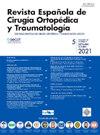使用骨水泥增强椎弓根螺钉和椎体置换术的技巧和窍门--文献综述,辅以两份病例报告。
Q3 Medicine
Revista Espanola de Cirugia Ortopedica y Traumatologia
Pub Date : 2024-11-01
DOI:10.1016/j.recot.2024.09.009
引用次数: 0
摘要
背景:随着全球人口老龄化的加剧,骨质疏松症的发病率也在不断上升:随着全球人口老龄化的加剧,骨质疏松症的发病率也在不断攀升,这增加了脊柱手术的需求,包括那些需要用骨水泥增强以提高结构稳定性的手术:本文深入探讨了椎弓根螺钉和椎体置换术(VBR)中骨水泥增强技术的细微应用,旨在优化骨质疏松脊柱的手术效果:方法:根据重要的临床和生物力学研究以及作者的临床经验,通过全面的文献综述,我们阐明了减少并发症和提高手术疗效的策略:结果:骨水泥增量在处理椎体骨折和固定骨质疏松椎体内的椎弓根螺钉方面显示出了良好的前景,聚甲基丙烯酸甲酯(PMMA)骨水泥的出现标志着脊柱外科手术取得了举足轻重的进步。我们重点介绍了术中措施,如选择预先注入骨水泥、使用插管螺钉还是栅栏螺钉,并强调了控制骨水泥粘度以防止渗漏和栓塞的重要性。通过两个病例报告,我们展示了VBR术后终板骨水泥的实际应用:尽管使用骨水泥增强会带来一定的风险,但在循证指南和外科专业知识的支持下,明智地应用骨水泥增强可大大提高骨质疏松患者脊柱结构的稳定性。通过增强牵拉、弯曲和旋转力方面的生物力学稳定性,可以减少器械长度。此外,VBF 还能显著降低终板烧结的发生率。未来的研究,尤其是关于抗生素负载的 PMMA 的研究,可能会进一步扩大其用途并优化其安全性。本文章由计算机程序翻译,如有差异,请以英文原文为准。
[Artículo traducido] Consejos y trucos para el uso de cemento óseo en tornillos pediculares y en reemplazos de cuerpos vertebrales: una revisión de la literatura respaldada por dos informes de casos
Background
The prevalence of osteoporosis is escalating alongside an aging global population, increasing the demand for spinal surgeries, including those necessitating cement augmentation for enhanced construct stability.
Objective
This article delves into the nuanced application of cement augmentation techniques for pedicle screws and vertebral body replacements (VBR), aimed at optimizing surgical outcomes in osteoporotic spines.
Method
Drawing from a comprehensive literature review according to important clinical and biomechanical studies and the authors’ clinical experiences, we elucidate strategies to mitigate complications and improve surgical efficacy.
Results
Cement augmentation has shown promise in managing vertebral fractures and in securing pedicle screws within osteoporotic vertebrae, with the advent of polymethylmethacrylate (PMMA) bone cement marking a pivotal advancement in spinal surgery. We highlight intraoperative measures like the choice between pre-injecting cement and utilizing cannulated or fenestrated screws, emphasizing the importance of controlling cement viscosity to prevent leakage and embolism. Through two case reports, we demonstrate the practical application of endplate cementation following VBR.
Conclusion
While the use of cement augmentation poses certain risks, its judicious application—supported by evidence-based guidelines and surgical expertise—can substantially enhance the stability of spinal constructs in osteoporotic patients. This allows a reduction in instrumentation length by enhancing biomechanical stability concerning pullout, bending, and rotational forces. Furthermore, the incidence of endplate sintering following VBF can be significantly reduced. Future research, particularly on antibiotic-loaded PMMA, may further expand its utility and optimize its safety profile.
求助全文
通过发布文献求助,成功后即可免费获取论文全文。
去求助
来源期刊

Revista Espanola de Cirugia Ortopedica y Traumatologia
Medicine-Surgery
CiteScore
1.10
自引率
0.00%
发文量
156
审稿时长
51 weeks
期刊介绍:
Es una magnífica revista para acceder a los mejores artículos de investigación en la especialidad y los casos clínicos de mayor interés. Además, es la Publicación Oficial de la Sociedad, y está incluida en prestigiosos índices de referencia en medicina.
 求助内容:
求助内容: 应助结果提醒方式:
应助结果提醒方式:


